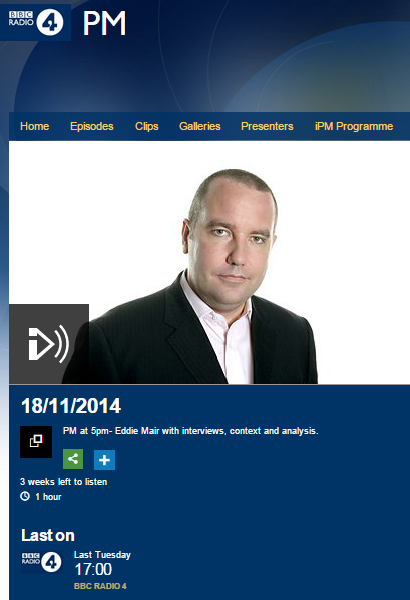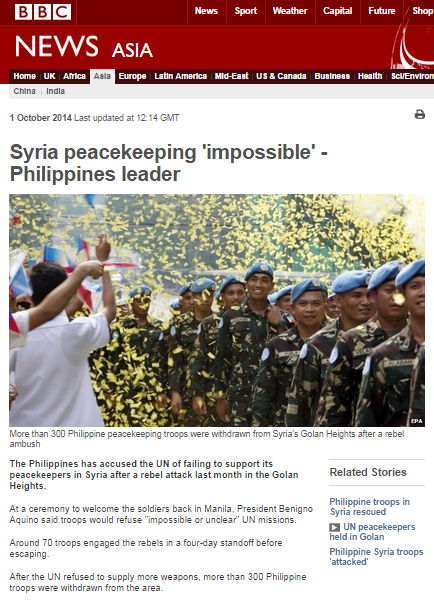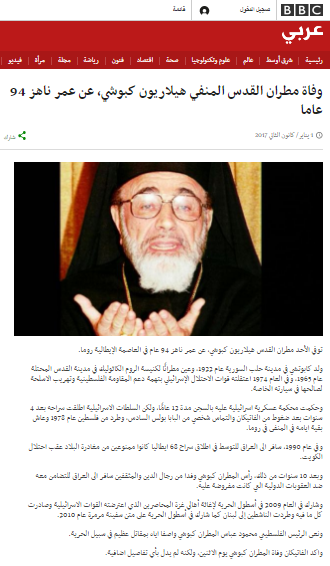As was noted in part one of this post, the final interview (available here from 16:14) in the long segment reporting on the terror attack at the Kehilat Ya’akov Synagogue in Jerusalem earlier that day which appeared in the BBC Radio 4 programme ‘PM’ on November 18th, featured Rosemary Hollis – Professor of Middle East Policy Studies at City University, London.
As an academic, Professor Hollis’ contribution to the report was presumably intended to provide UK audiences with the type of context and analysis which would enable them to enhance their “awareness and understanding” of this particular “international issue”. However, basic inaccuracies and omissions in Hollis’ account in fact diminished the possibility of better audience comprehension.
The interview with Rosemary Hollis came directly after a previous one with the cousin of Avraham Goldberg who had been murdered in the terror attack just eight hours or so before the programme went on air. Presenter Eddie Mair opened his conversation with Hollis thus:
“We asked you in to talk about the status of Jerusalem. Just before we do that, we just heard the view of Israel and its place in the Middle East from a grieving relative. It’s a view that will be contentious.”
Hollis: “Yes; it was a beautiful tribute to Mr Goldberg and I think you would find that for many individual Palestinians, equally beautiful tributes could be paid for their awareness of the issues, for their innocence, for their devotion to family and to religious values and so on. One has to be careful here. If Mr Goldberg’s cousin is worried about a mind-set in the killers, that needs to be dealt with on a specific level in terms of where these young men were coming from, what their experience of life and occupation had been, and not to tarnish all Palestinians with some characteristics which may or may not be appropriate to apply to some individuals. It’s a classic problem in conflict and there is no justice in the killings that take place. To find it in the evilness of the perpetrator is a natural instinct but it’s not conducive to ending the kind of conflict that we’re in here.”
Yes, the BBC really did bring in an academic in order to promote to audiences a narrative of equivalence which, inter alia, suggests that hacking a man in his seventh decade to death with a meat cleaver for no other reason than his being a Jew should be seen in the context of the terrorist’s “experience of life and occupation” and where he was “coming from”. Hollis continued:
“Now, at the moment the tension in Jerusalem can be traced back to the beginning of the summer before the Gaza war. The tension started with the abduction and killing of Jewish students and then a revenge killing of a Palestinian.”
The BBC has of course also used those events as part of a menu of factors it promotes as ‘explaining’ the latest surge in violence and terrorism. Notably, neither Hollis nor her host bothered to point out to audiences that, crucially, the kidnappings and murders of the three Jewish teenagers were carried out by a Hamas cell from Hebron or that the attack was financed by Hamas in Gaza: the same Hamas which is partner to the Palestinian unity government which had been sworn in ten days before the three teenagers disappeared. Likewise, no attempt was made to clarify to listeners that the “Gaza war” (apparently nothing happened in Israel during July and August 2014 which BBC audiences need to know about) was instigated by that same terrorist organisation.Whilst those inconvenient facts would of course spoil the narrative of equivalence, facts they are and BBC audiences should be made aware of their existence.
Hollis then went on to inaccurately represent the topic of the status of Palestinian residents of Jerusalem.
“It’s also worth remembering that the status of the Palestinians living in East Jerusalem is unique in the pattern of the conflict. The East Jerusalem areas captured by Israel in 1967 – captured from Jordan who controlled them between the date of the foundation of Israel in ’48 and 1967 – that area of Jerusalem was annexed to Israel.”
Listeners not familiar with Middle East history would of course be unlikely to appreciate from that account that the euphemistically termed Jordanian “control” of parts of Jerusalem for 19 years came about after Jordan attacked the fledgling Jewish state and belligerently occupied and later annexed the areas concerned in a move not recognised by the international community. Hollis continued:
“The Israelis say it is their eternal unified capital and their sovereignty is indisputable. Of course the Palestinians who live there do dispute that sovereignty and the East Jerusalem Palestinian population are not citizens of Israel like the Arab citizens of Israel that Mr Goldberg’s cousin was describing. They have what they call laissez-passer: they have an East Jerusalem ID. They’re supposed to be lucky in the scheme of things compared with other Palestinians because they are not subject to direct occupation. But they are subject to security control and over the last few months hundreds of them have been arrested on suspicion – not on trial.”
Rosemary Hollis’ portrayal is of course factually incorrect. Arab residents of the areas of Jerusalem which came under Israeli control after the Six Day War are entitled to apply for Israeli citizenship – and many have done so – which affords them the same rights as any other citizen of Israel of whatever religion or ethnicity. This was not the first occasion upon which this issue has been misrepresented to BBC audiences: the same inaccurate claim was made in a report by Yolande Knell on BBC World Service radio earlier in the month. Hollis also of course failed to point out to audiences that the vast majority of Palestinians live under the administration of the Palestinian Authority in Areas A, B and the Gaza Strip and that the minority living in Area C where Israel still has civil and security control do so because their representatives agreed to that arrangement under the terms of the Oslo Accords and then subsequently sabotaged permanent status negotiations by instigating the second Intifada. Hollis’ reference to the arrest of “hundreds” of Palestinian residents of Jerusalem over the past few months of course erased from audience view the fact that there have been countless incidents of violent rioting and terror attacks during that period of time. The conversation continued with presenter Eddie Mair saying:
“Can we step back even further than the summer to before any of us were alive? How did Jerusalem come to be a place that’s so important to people of different faiths?”
Hollis: “Well you can go back a couple of millennia if you like. [laughs] It is obviously of importance to Muslims, Christians and Jews. And I think I would say that there’s not a square inch of Jerusalem that isn’t contested and religious sites are as contested as others. And it’s a little bit confusing to start talking about freedom of worship because an aspiration since the beginning of the twentieth century – which saw the fall of the Ottoman Empire and originally the occupation of Jerusalem by the British and under the British mandate there – was to talk about what should be the future sovereign arrangement for Jerusalem. And there’s always been talk about it should be an international dispensation because of its importance in religious terms.”
This is of course also not the first time that we have seen the BBC promoting the idea of Jerusalem as a corpus separatum – see previous examples here and here. What Hollis of course did not tell listeners to Radio 4 is that the proposal was conditioned on the acceptance of the Partition Plan by the relevant parties and was rejected by the Arab side, and that in any case, the corpus separatum plan was conceived with a ten-year time limit, after which residents of the designated area were to vote in a referendum to determine its status. Nevertheless, it was interesting to see how Hollis used the redundant argument for a corpus separatum to deflect attention from the progressive issue of equal prayer rights for all at Jerusalem’s holy places.
No less inaccurate was Rosemary Hollis’ portrayal of what she terms “Jewish doctrine” (as though there were one approach alone) on the subject of Jewish prayer rights at Temple Mount.
“What we’ve had in the Israeli context is an interpretation of Judaism on the part of religious nationalists – the bedrock of the settler movement – err…who are effectively contesting some positions traditionally adopted in Jewish doctrine which says that one should not wish to pray on the Temple Mount because that area is not to be treated as an area of worship until the coming of the Messiah. But the Religious Nationalists are talking about land which they consider both the national birth right of Jewish people and of religious importance. And that combination leads them to challenge most directly latterly the Palestinian and Palestinian Muslim position on some of these sites.”
Hollis’ misrepresentation of the topic of “traditionally adopted […] Jewish doctrine” of course not only confused the issue of differing approaches to equal prayer rights on Temple Mount with the separate subject of some strains of thought according to which the building of the third Temple is conditioned upon the appearance of the Messiah, but also erased the fact that different schools of thought on the topic of Jewish entry to and prayer at Temple Mount existed even before the appearance of the “settler movement” she clearly sought to portray as the root cause of the current tensions.
Once again, rather than providing listeners with accurate factual background intended to aid their understanding of the context of that morning’s murders of five Israelis in a terror attack not described as such by the BBC, this programme busied itself more with promoting a view of the issue framed by specific political motivations. And yet again, the issue of Palestinian incitement remained outside of that BBC framing.




